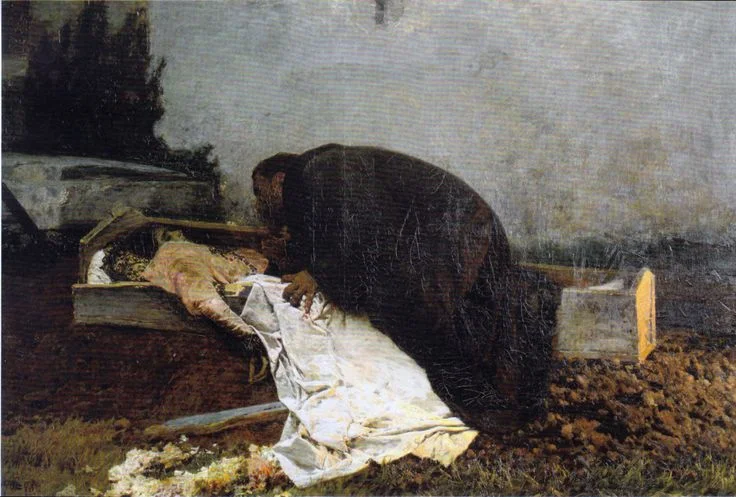Starting at the End
We’re coming at this Card Talk from a different angle than most. Consider this more midrash, than exegesis. A “what if?” more than “this is what happened.” So we’ll start with an unusual proposition: What if it was the man questioning Jesus, not the demons?
The Man, The Demons, The Pigs
Here’s the story in Mark 5:1-20: Jesus and His disciples cross the water into the region of Gerasenes. The second His feet touch the shore, Jesus was verbally accosted by a man with “an unclean spirit,” a demon, whose situation was dire.
He lived among the tombs, and no one could restrain him any more, even with a chain, for he had often been restrained with shackles and chains, but the chains he wrenched apart, and the shackles he broke in pieces, and no one had the strength to subdue him. Night and day among the tombs and on the mountains he was always howling and bruising himself with stones. (Mark 5:3-5)
When the man saw Jesus, he ran, threw himself at Jesus’ feet, and screamed, “What have you to do with me, Jesus, Son of the Most High God? I adjure you by God, do not torment me” (vs 7). So Jesus gets into a shouting match with the demon (which He wins), and He tells the demon he’s about to be exorcised from the man. But being a nice exorcist, Jesus asks the demon its name and learns that it is not one demon, but a whole bunch of them when it/they replied, “My name is Legion, for we are many” (vs 9). The demon(s) beg not to be sent too far away because they like the region (they’ve put down roots, it’s on the beach) and asks to be sent into a herd of pigs nearby. Jesus, again being a nice exorcist, says sure and sends the legion of demons into the assembled pigs.
So he gave them permission. And the unclean spirits came out and entered the swine, and the herd, numbering about two thousand, stampeded down the steep bank into the sea and were drowned in the sea. (vs 13)
Needless to say, this pissed off the owners of the pigs, who ran into town and told everyone in earshot what happened, eventually demanding that Jesus get the hell out of the region (exorcism pun!). In the meantime, the formerly possessed man, now clothed and thinking clearly, asked Jesus if he could go with Him on His journey. Jesus tells him to go home to his family and his people, and “tell them how much the Lord has done for you and what mercy he has shown you” (vs.19), which of course he did to the amazement of everyone.
There’s the story. But let’s return to vs 7 and our initial question.
What if this is the man talking,
not Legion the demons?
Who’s Asking?
When he saw Jesus from a distance, he ran and bowed down before him, and he shouted at the top of his voice, “What have you to do with me, Jesus, Son of the Most High God? I adjure you by God, do not torment me!” (Mark 5:6-7)
What are we suggesting? Simple: that it’s the man, not the demons, talking to Jesus in vs 7.
Yes, in vs 8-9 Jesus is talking to the demons and the demons answer in vs 9-12, but we’re asking, what if the initial question was from the man? He isn’t yet “sitting…clothed and in his right mind” (vs 15), but he is briefly lucid in that moment, perhaps because the demons were so scared at the approaching of Jesus. Why would we even propose this question? Re-read verses 3-5 above.
This was a man who had been regularly abused by those in his community who tried everything to cure, save, and help him, but now just try to keep him out of the way: bind him, hold him captive, so he is not a danger to others. He is used to being seen as “other,” as less than. And here comes Jesus. Another in a long line of supposed healers who will only cause him additional pain.
Sure. You think we’re heretics. That’s nothing new. But this reading is not outside the scope of the rest of the chapter. Consider the other pericopes in Mark chapter 5.
The Rest of the Stories
In the rest of chapter 5 of Mark, verses 21-43, Jesus crosses back across the waters and performs two more healings: He brings Jarius’ 12 year old daughter back from the dead, and heals a grown woman with the 12 year old bleeding problem. We won’t spend time with the parallelism (e.g. young and old women, the obvious use of 12 symbolizing the renewal and rebirth of Israel’s 12 tribes heralded by Jesus’ actions). Let’s look at this two women’s stories. Two people who could not find the healing that they needed from those in their community (sound familiar?).
No actions of the religious leaders or politicians saved them. The younger woman was on her death bed, indeed she died and had to be brought back to life by Jesus. For the older women, the text makes it clear that she spent 12 years being taken advantage of by doctors, to the point of her being poverty stricken, while her ailment only got worse.
In addition, she was “unclean” in the eyes of the people, removing her from right worship within the Temple worship [and we’ve written quite a bit about the misconceptions of “clean and unclean” as it relates to the Bible. Read about that here.].
Those in charge of physical, social, and spiritual healing could do nothing for either of these women.
Until Jesus shows up.
All three of these characters know what it is like to have a community think they know what is best and astonishingly fail.
They all have reason to doubt, to question whether healing is possible, whether they will be taken advantage of and hurt by the people who have known them the longest, to say nothing of this stranger.
Which brings to bear another element: the man with legion demons was a gentile, not a Jew (didn’t you wonder why there were so many pigs around? They ain’t kosher.). The man was used to taking it from those in his own community, he didn’t need any more pain from the outside.
Turn on the news and then walk into a church. Listen to things that have been shouted from the pulpit in recent days. Is it really so hard to believe that someone in their right mind might be skeptical of “good christians”?
Perhaps we should not be so quick as to wonder why those on the outside of the household of faith might not be flocking to us for aid or help.
Perhaps we just seem like another in a long line waiting to hurt them.
But what do we know: we made this game and you probably think we’re going to Hell.







